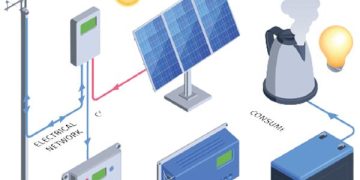In a world increasingly illuminated by the urgent need for sustainable solutions, businesses are turning their gaze skyward, discovering that the sun offers more than just warmth and light—it presents a promising revenue stream. Solar energy, once viewed merely as an environmental imperative, is now emerging as a viable financial opportunity for enterprises of all sizes. As solar technology advances and costs plummet, companies are finding innovative ways to harness this abundant resource, transforming sunlight into a strategic asset. This article delves into the burgeoning trend of solar energy as a revenue stream for businesses, exploring how enterprises are integrating solar solutions to not only power their operations but also enhance their bottom lines, contributing to a brighter, more sustainable future.
Harnessing the Sun: Innovative Business Models in Solar Energy
In today’s rapidly evolving energy landscape, businesses are discovering the untapped potential of solar energy as a profitable revenue stream. Companies are no longer just consumers of solar power; they are becoming producers, using innovative models to capitalize on their solar investments. By installing solar panels on unused roof space or land, businesses can generate electricity not only for their own consumption but also for sale back to the grid, creating a new line of income. This approach is supported by advancements in technology and favorable policies, making it easier than ever for companies to turn sunlight into profit.
Some of the most popular business models being adopted include:
- Power Purchase Agreements (PPAs): Businesses can enter into agreements to sell the electricity generated by their solar installations to utilities or other organizations at a predetermined rate.
- Solar Leasing: Companies lease their rooftops or land to solar developers who install and maintain the solar systems, providing a steady rental income stream.
- Community Solar Programs: Businesses can host community solar projects, allowing local residents and organizations to purchase shares of the solar power generated, fostering community engagement and generating additional revenue.
These models not only enhance a company’s financial performance but also strengthen its commitment to sustainability, aligning with the growing demand for eco-friendly practices.

Maximizing Profit: Strategic Investments in Photovoltaic Systems
Investing in photovoltaic systems is not just about sustainability—it’s about seizing a profitable opportunity that can enhance your business’s financial health. By harnessing the power of the sun, companies can significantly reduce energy costs and generate substantial revenue through various innovative strategies. Photovoltaic systems offer a dual benefit: minimizing operational expenses and creating new revenue streams. With the right approach, businesses can turn their rooftops into profit-generating assets.
- Net Metering: Sell excess energy back to the grid, turning surplus power into a consistent source of income.
- Power Purchase Agreements (PPAs): Partner with utility companies to provide solar-generated electricity, ensuring a stable revenue flow.
- Government Incentives: Take advantage of tax credits and rebates designed to offset installation costs, further increasing profit margins.
These strategies, when implemented effectively, not only maximize profit but also align with a company’s commitment to sustainability. Embracing solar energy is a strategic investment that promises both immediate and long-term financial benefits.
Unlocking Tax Incentives: Navigating Solar Energy Financial Benefits
Embracing solar energy not only positions businesses as environmentally conscious but also opens doors to a suite of enticing tax incentives. Navigating these financial benefits can transform solar energy installations into significant revenue streams. Federal and state tax credits are among the most substantial incentives, allowing businesses to offset a large portion of their solar investment. The Federal Investment Tax Credit (ITC) offers a credit of up to 26% of the installation cost, while many states provide additional credits or rebates.
Beyond tax credits, businesses can also benefit from accelerated depreciation, allowing them to write off the cost of their solar system more quickly, improving cash flow. Moreover, certain localities offer performance-based incentives (PBIs), rewarding businesses for the actual energy their systems produce. By leveraging these incentives, companies can not only reduce upfront costs but also enjoy ongoing savings, making solar energy a smart financial strategy. Here are some key benefits to consider:
- Reduction in operational costs through lower energy bills.
- Increased property value due to the addition of renewable energy assets.
- Enhanced brand image by showcasing a commitment to sustainability.
- Potential income from selling excess energy back to the grid.

Empowering Growth: Integrating Solar Solutions into Business Operations
Incorporating solar energy into business operations is not just a step towards sustainability, but also a strategic move to enhance revenue streams. By investing in solar solutions, companies can significantly reduce operational costs, increase energy efficiency, and even generate additional income through surplus energy sales. The transformation begins with evaluating energy consumption patterns and identifying opportunities for solar integration.
- Cost Savings: By harnessing solar power, businesses can reduce reliance on traditional energy sources, leading to substantial cost savings on utility bills.
- Revenue Generation: Excess energy produced can be sold back to the grid, providing an additional revenue stream and improving overall profitability.
- Brand Reputation: Adopting renewable energy enhances corporate social responsibility, positively impacting brand image and customer loyalty.
Implementing solar solutions can also open doors to government incentives and tax breaks, making the transition not only environmentally responsible but financially rewarding. Businesses that leverage these benefits can achieve a competitive edge, positioning themselves as leaders in innovation and sustainability.
Wrapping Up
As we draw the curtains on our exploration of solar energy as a revenue stream for businesses, it becomes clear that the sun is not just a celestial body, but a powerful ally in the quest for sustainable growth. In a world where economic and environmental priorities often collide, solar energy emerges as a harmonious bridge, offering businesses the opportunity to illuminate their financial future while reducing their carbon footprint. By harnessing the power of the sun, companies can not only generate clean energy but also unlock a spectrum of financial benefits that extend beyond the bottom line. As we stand at the dawn of this solar revolution, the question remains: will your business be among the pioneers to embrace this golden opportunity, or will it be left in the shadows? The choice is as bright as the future we dare to envision.


































